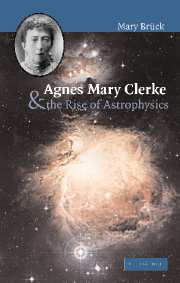Book contents
- Frontmatter
- Contents
- Acknowledgements
- Introduction
- 1 Family background in County Cork
- 2 Ireland and Italy
- 3 London, the literary scene
- 4 The History of Astronomy
- 5 A circle of astronomers
- 6 A visit to South Africa
- 7 The System of the Stars
- 8 Social life in scientific circles
- 9 Homer, the Herschels and a revised History
- 10 The opinion moulder
- 11 Popularisation, cryogenics and evolution
- 12 Problems in Astrophysics
- 13 Women in astronomy in Britain in Agnes Clerke's time
- 14 Revised System of the Stars
- 15 Cosmogonies, cosmology and Nature's spiritual clues
- 16 Last days and retrospect
- 17 Epilogue
- Notes
- Appendix
- Bibliography
- Index
8 - Social life in scientific circles
Published online by Cambridge University Press: 14 August 2009
- Frontmatter
- Contents
- Acknowledgements
- Introduction
- 1 Family background in County Cork
- 2 Ireland and Italy
- 3 London, the literary scene
- 4 The History of Astronomy
- 5 A circle of astronomers
- 6 A visit to South Africa
- 7 The System of the Stars
- 8 Social life in scientific circles
- 9 Homer, the Herschels and a revised History
- 10 The opinion moulder
- 11 Popularisation, cryogenics and evolution
- 12 Problems in Astrophysics
- 13 Women in astronomy in Britain in Agnes Clerke's time
- 14 Revised System of the Stars
- 15 Cosmogonies, cosmology and Nature's spiritual clues
- 16 Last days and retrospect
- 17 Epilogue
- Notes
- Appendix
- Bibliography
- Index
Summary
The British Astronomical Association
Apart from the Royal Institution, which welcomed the public to its scientific lectures, there was for a long time little opportunity in London for Agnes Clerke and like-minded women to foregather with people who shared their enthusiasm for astronomy.
Men astronomers, amateur and professional, enjoyed a common fraternity at the Royal Astronomical Society, founded in 1832, which met every month in London. A fraternity it truly was, as women were excluded by statute from its ranks. Fellowship of the Society was open to any man with an interest in astronomy, provided he was duly nominated and paid his fees. It was at the same time much more than a social club. The Presidency of the Society or the award of its gold medal were high accolades, and many leading members were also fellows the Royal Society.
In 1890 the British Astronomical Association was founded to cater for the interests of amateur astronomers, some of whom were dissatisfied with the Royal Astronomical Society because the fees were high and because women were ineligible. Some complained also that the society was becoming too academic. The suggestion of forming a society to include ordinary lovers of astronomy came originally from W.H.S. Monck, the Dublin amateur astronomer who had been Aubrey Clerke's student contemporary, in a letter to the Observatory magazine, citing as a model the older Liverpool Astronomical Society to which Agnes Clerke belonged by correspondence since 1885.
- Type
- Chapter
- Information
- Agnes Mary Clerke and the Rise of Astrophysics , pp. 98 - 114Publisher: Cambridge University PressPrint publication year: 2002



